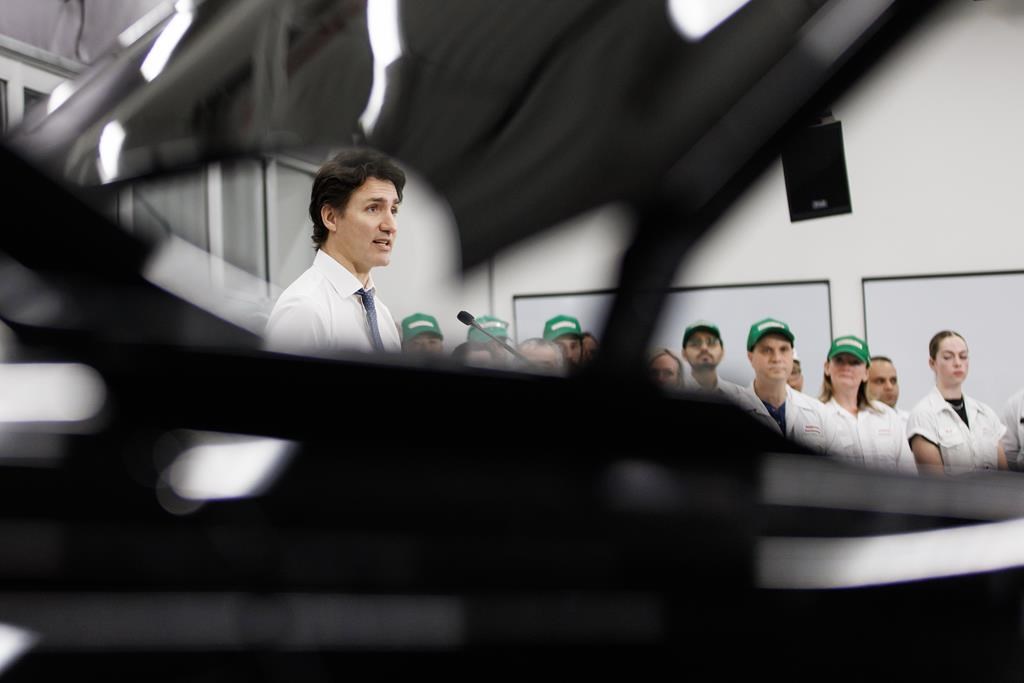Former British PM Margaret Thatcher dead at 87
Posted April 8, 2013 8:10 am.
This article is more than 5 years old.
Former British prime minister Margaret Thatcher died Monday following a stroke, a spokesman for the family said.
Thatcher, Britain’s longest serving prime minister of the 20th century, dominated politics in her own country for a decade and carved out for herself a formidable position on the world stage.
Thatcher was born Margaret Hilda Roberts on Oct. 13, 1925, the daughter of a grocer in Grantham, central England. She was made head girl of her school and won a scholarship to Oxford University where she studied natural sciences. She joined the Conservative Party before graduating in 1947.
She won her first parliamentary seat in 1959 and served as minister of education under Edward Heath, prime minister from 1970 to 1974.
After Heath’s government fell, Thatcher marshalled support to oust him as party leader in February 1975 and embarked on a campaigning four years with the promise: “Socialism is on its way out”.
She came to power in a general election on May 3, 1979 defeating Labour prime minister James Callaghan by a margin of 43 seats.
Britain’s first woman prime minister launched straight into a program of social and economic reform.
Inflation was reined in by fierce financial belt-tightening and loss-making state monopolies were privatized. But while “Thatcherism” made the bulk of Britons better off, unemployment doubled by the mid-1980’s to over 12 percent of the workforce.
At the October 1980 Conservative Party annual conference Thatcher made a defiant speech stressing her determination to stick to tough economic policies despite doubts expressed within her party.
An opinion poll in 1981 rated her Britain’s most disliked prime minister of all time, but after sending a naval task force to the South Atlantic to retrieve the remote Falkland Islands from Argentine invaders she was swept back to power in 1983 on a wave of patriotism.
In 1984 an Irish Republican Army (IRA) bomb attack on her Brighton hotel came close to killing her entire cabinet. Five people died and some close colleagues were severely injured but Thatcher survived unscathed.
During the early 1980’s Thatcher implemented a series of parliamentary bills which whittled away trade union powers. By the time a bitter year-long national strike ended in defeat for coal miners in March 1985 the days when organized labour could dictate to British governments had gone.
In Europe she demanded a huge refund on Britain’s contributions to the community budget and brought community business to a virtual standstill until she got it.
Despite inexperience in foreign affairs, she became a major international figure, particularly through close ties with former U.S. president Ronald Reagan.
When Soviet leader Mikhail Gorbachev came to power in Moscow she reversed a previously strong anti-Soviet stance to form a strong working relationship with the Kremlin.
In June 1987 her third successive general election victory gave her a huge 101-seat majority and set another new record in British politics.
A new local government poll tax introduced in April 1990 sparked protests throughout the country and unprecedented violence in central London as police and protesters fought pitched battles.
Opinion polls showed 75 per cent of the population opposed the tax because it largely disregarded people’s ability to pay.
Thatcher’s intolerance of dissent and imperious manner finally led to her dramatic downfall. After 11 years in power she bowed to a revolt in the Conservative Party, pulling out of a second round of voting in a leadership contest with her former defence minister Michael Heseltine.
But she retained enough influence to ensure Heseltine did not succeed her, pushing the claims of her protege John Major. On November 28, 1990 she left the official prime minister’s residence, 10 Downing Street, for the last time.
Out of power, Thatcher continued to wield influence and attract support, particularly for her stance against closer integration with the European Community. She had only to appear at a Conservative Party conference to win a standing ovation which threatened to upstage Major.
When she celebrated her 70th birthday in October 1995 she attracted warm tributes from around the world. A gala dinner to mark the occasion was attended by her successor and by Britain’s Queen Elizabeth II. In Washington D.C. hundreds of politicians and celebrities, including former U.S. first lady Nancy Reagan, attended a fund-raising birthday party.
Thatcher joined Major on the campaign trail in April 1997 hoping to win an historic fifth term for the Conservatives. But after 18 years of Conservative rule the opposition Labour Party won a landslide victory on a scale unseen for 165 years. Six conservative cabinet ministers lost their parliamentary seats.
The arrest of former Chilean leader Augusto Pinochet in London on an extradition warrant from Spain for human rights abuses during his rule prompted Thatcher to show her support on live television. She visited Pinochet while he was under house arrest, thanking him for his help during Britain’s 1982 campaign to reclaim the Falkland Islands, and condemning his arrest as “inhumane”.
In early 2002, ill health forced Thatcher to pull out of public life. Heeding the advice of her doctors following a number of minor strokes, she announced she would retire from public speaking out continued to attend debates in the House of Lords. She was given a seat in Britain’s upper chamber in 1992 when she was made Baroness Thatcher of Kesteven.
In 1995 she was appointed to the Order of the Garter, Britain’s oldest and highest order of chivalry. The Order is awarded by the British sovereign in recognition of outstanding public service and achievement.
Thatcher was among the dignitaries who attended the state funeral for President Reagan in Washington in June 2004. She touched Reagan’s coffin and curtseyed before being slowly led away by senate majority leader Bill Frist.
In August 2004, Thatcher’s son Mark was arrested in Cape Town and charged with involvement in a foiled coup against the government of oil-rich Equatorial Guinea. Mark Thatcher pleaded guilty to financing the coup attempt and was given a four-year suspended sentence and a $500,000 fine.
Thatcher returned to her former residence at Number 10 Downing Street in September 2007 at the invitation of Labour Prime Minister Gordon Brown. The visit included a tour of the building and private talks with Brown in the Prime Minister’s study, still known as the Thatcher Room.
In June 2010 a frail-looking Thatcher paid another visit to 10 Downing Street, this time at the invitation of Prime Minister David Cameron who had ended the Conservative Party’s 13 years in opposition the previous month.
During Pope Benedict XVI’s state visit to Britain the following September, Thatcher was well enough to join hundreds of British dignitaries from the worlds of politics, business, culture and religion to hear him deliver a speech in Westminster Great Hall.
Thatcher has suffered a number of health scares in recent years. In June 2009 she spent two weeks in hospital after falling and breaking an arm. In October 2010 she spent another two weeks in hospital after she fell ill with flu. In December she spent Christmas in hospital following minor surgery to remove a small growth from her bladder.










